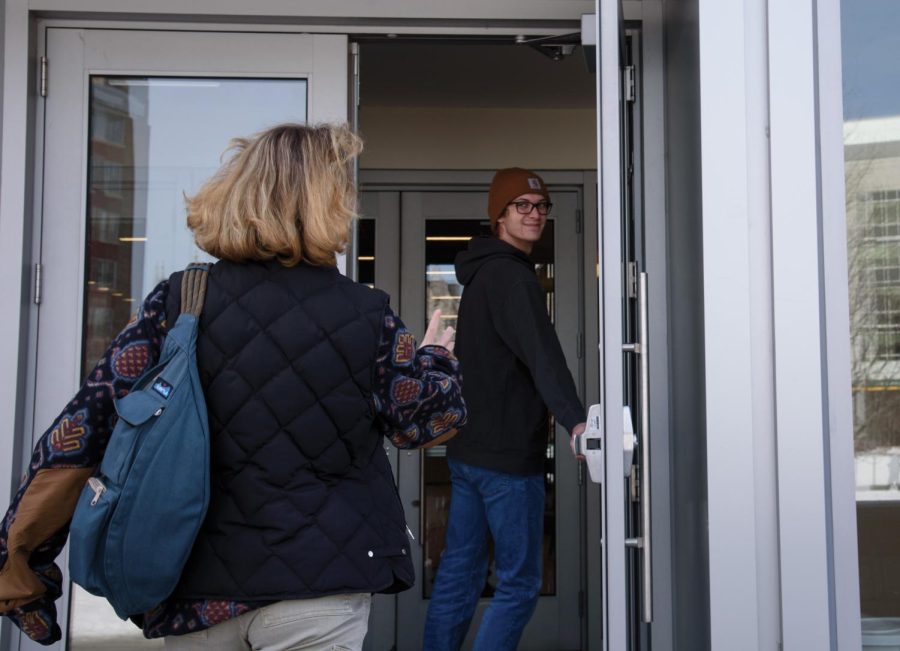Exploring door-holding at UVM
Photo Illustration: Students holding the door for each other at Innovation Hall. On the topic of door-holding, anthropology professor Luis Vivanco said “there are all kinds of interpersonal politics that go into holding the door.”
March 8, 2023
One of the cultural shifts first-year Cy Stavros had to adjust to when coming to UVM was the culture of door-holding that is central to life on campus.
“I never held the door in high school,” Stavros said. “People would mostly just mind their own business. But since coming to UVM, I have made an effort to keep the door open for anyone I can.”
Though it’s easy to take for granted, UVM has fostered an environment where holding the door for friends, professors and strangers is an element of social life.
Miriam Eligberg, a junior from New York state, said they noticed more people holding doors since coming to the University.
“People here definitely make more of an effort to hold the door than any place I’ve ever been,” Eligberg said. “It’s beyond just pushing it more open, but really going out of their way to let others pass.”
Stavros believes the number of doors on campus and the bustling nature of student life fosters this cultural norm.
“If I had to guess, the layout of campus, making people constantly move in and out of buildings, is probably what causes all the door-holding,” he said. “People are always moving around, and there are so many of us that there’s always someone to hold the door.”
First-year Willa Boglioli is accustomed enough to the door holding culture that not holding the door for someone comes across as impolite.
“I’d think they were being quite rude,” she said. “It’s not a hard thing to do.”
Another feature of UVM’s campus that may encourage door-holding is the electronic locks found throughout the campus, particularly in residence halls.
“I often visit friends in other dorms, but to get in, I always rely on someone who lives there opening the door for me,” Boglioli said. “It’s a needed element to get around campus.”
Luis Vivanco, a professor of cultural anthropology and the chair of the anthropology department, spoke on UVM’s door holding culture.
“As long as I, or anyone I talked to, could remember, it has always been a norm at the University,” Vivanco said.
To find out what others thought about door-holding at UVM, Vivanco contacted scholars and community members at the University through the Center of Research on Vermont, a student-led interdisciplinary laboratory that connects experts and students through networks and opportunities.
Interestingly, a variety of responses emerged from Vivanco’s exploration, each with their own way of explaining the phenomenon of door-holding at the University.
“There were some responses that saw door holding as a response to the weather we have in Vermont,” Vivanco said. “A method to get everybody safely inside as quickly as possible.”
A different respondent answered Vivanco’s question by theorizing that door-holding at Vermont boiled down to reciprocity.
“We had one professor argue that the doors with connecting vestibules on campus allow for a system of reciprocity, where people take turns holding the door for one another,” he said.
Another popular idea in the discussion linked Vermont’s small-town culture with reflecting upon the broader University, inspiring the neighborly action of holding the door for others.
However, Vivanco does not necessarily believe any one of these theories alone entirely explains the phenomenon and it instead boils down to a complex system of social dimensions.
“There are all kinds of interpersonal politics that go into holding the door,” Vivanco said. “Social dynamics, like age, can play a major role. It’s subtle factors like these that are always impacting these quick decisions.”
Vivanco also said spatial factors can be central to the phenomenon.
“There’s a system of proxemics also at play,” he said. “Monitoring social dynamics, how many people are coming in and where they are in relation to the door is crucial to these actions.”
Whatever the multitude of reasons that drive door-holding at UVM, it’s become a reality of life on campus. However, some students arriving at the University are taken aback by this cultural norm.
Jeremy Hoko, a first-year from Connecticut, said the expectation of door-holding is a stressor in his daily life.
“I feel like most of the time, the person going out of their way to hold the door for me doesn’t actually want to, they just feel obligated, but it only makes me feel like I have to rush or that I’m wasting their time,” Hoko said.
Many students like Hoko may have experienced having to awkwardly run to a door someone’s holding for them.
In contrast, Stavros sees the door-holding culture on campus in a more positive light.
“I think it’s a telling reflection of the friendliness of UVM,” Stavros said. “People here always go out of their way to help others.”







